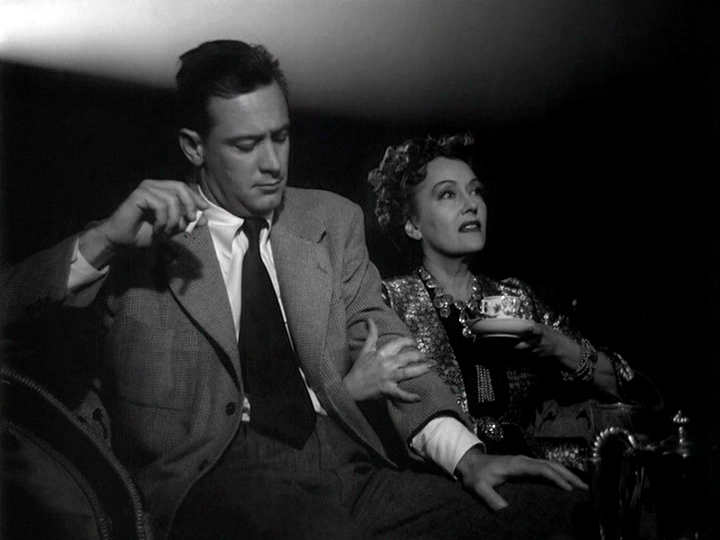Matthew Dessem wrote an essay for the lamented Dissolve a decade ago about the Charles Brackett-Billy Wilder screenwriting partnership. I wish I could find something other than dead links. Before reading it I thought I could make a facile distinction between the films they wrote and Wilder directed, and the films Wilder wrote with I.A.L. Diamond. It’s a testament to Wilder that little separates, say, The Major and the Minor and Love in the Afternoon. But this is not a compliment, not entirely. Teens discovering film consider Double Indemnity, Sunset Boulevard, Some Like It Hot, and The Apartment essential components of their education, as they were in mine, but there isn’t one of these unblemished by puerile humor, overacting, emphasis. There’s a sense in which Wilder was for so many years shorthand for “smart entertainment” because he gave the audience what it wanted: jokes and sexy banter and indelible performances, for sure and deservedly; also scenes and lines for which we can congratulate ourselves for feeling superior to the suckers and rubes on screen (Irma La Douce), feeling superior to the superior person on screen (The Apartment), or sympathizing with the superior person on screen (Sunset Boulevard) — the true definition of cynicism, in other words. Cynicism is the candle whose wick is exhausted romanticism. But this refugee whose family Hitler exterminated had something to be cynical about.
Watching The Apartment again last fall, I had renewed appreciation for the leads, especially Shirley MacLaine’s scenes, particularly one in a ratty Manhattan tiki hut where Fred MacMurray, smugness modulated for the sake of a character, breaks up with her. Jack Lemmon’s collar-tugging desperation and yen for bourgeois smallness never had a better outlet. But the other performances! The chorus of executives competing to use “Buddy Boy”‘s apartment are pitched to act at the vaudeville level; the camera is too close or in TV-style medium shot. I’m sick of them after one scene yet Wilder wheels them out continuously until I yell, I get it, they’re awful. The film has plenty of virtues: the MacLaine-Lemmon exchanges, a felt sense of architecture and of people comfortable in urban spaces, Yiddish humor and life. For once Wilder didn’t treat a woman’s sexual passion and interest in a relationship as something — merely — to laugh at. It has a swing and it still feels hip. It probably deserved its Best Picture Oscar.
Few of Wilder’s lesser known films deserve exhuming. The Major and the Minor (Ginger Rogers impersonating a child is less convincing than a girl impersonating an adult), The Spirit of St. Louis, Love in the Afternoon, One, Two, Three, Irma La Douce, Kiss Me, Stupid, The Front Page, Fedora — as David Thomson once wrote, shaking his head, these are grim things to watch on a Saturday (Witness For the Prosecution wastes ten minutes on a stupid stair/wheelchair gag and it proves Marlene Dietrich a terrible actress when forced to “act”). The blam-blam pace of One, Two, Three and Kiss Me, Stupid is like a hammer coming down repeatedly on a canary. He worshiped Ernst Lubitsch and to his credit never pretended he matched him, which works for me because even minor Lubitsch like Cluny Brown understands the importance of populating a film with characters who interact in a plausible manner in pastoral and urban spaces; the verisimilitude comes without the imposition of smart talk. Consider the details he lays on so thickly: William Holden’s voice-over in Sunset Boulevard, a sign that Wilder was as suspicious of camera as he was strong women; Ray Milland’s Oscar-winning drunkenness in The Lost Weekend, rightly dismissed by Michael Gebert as “slices of ham with no resemblance to alcoholic reality,” like John Barrymore imitating Olivier; the president of the insurance firm in Double Indemnity, enunciating like a Broadway fop, and Mr. Dietrichson, the patsy, so abrasive and nasty that I’m relieved he’s murdered (the genuine love affair is between Fred MacMurray’s Walter Neff and Edward G. Robinson’s Keyes).
By no means am I arguing for Wilder’s dismissal. An honest retrospective demands acknowledging his limits. Cameron Crowe’s essential book length conversation included an annotated film bibliography in which “beautiful” and “underrated” appears next to a depressing number of entries. He was “smart,” yes, in the ways that count as well as the ways that didn’t. The good films seem inexhaustible. A favorite I haven’t mentioned he didn’t direct: the Brackett-Wilder script for Midnight, a 1939 film directed by Mitchell Leisen starring Claudette Colbert as a gold digger who hitches herself to a wealthy French family prepared to believe her and Dom Ameche as the cab driver prepared to disillusion her. With a supporting cast that includes Barrymore, Mary Astor, Francis Lederer, and Hedda Hopper, it can’t lose; and Leisen, a decided non-auteur who directed a few other excellent scripts (Preston Sturges’ Easy Living), understood pace, setting, and farce years before Wilder did. I watch Midnight once a year. It’s smart entertainment without the cynicism. I know, I know — shut up and deal.

